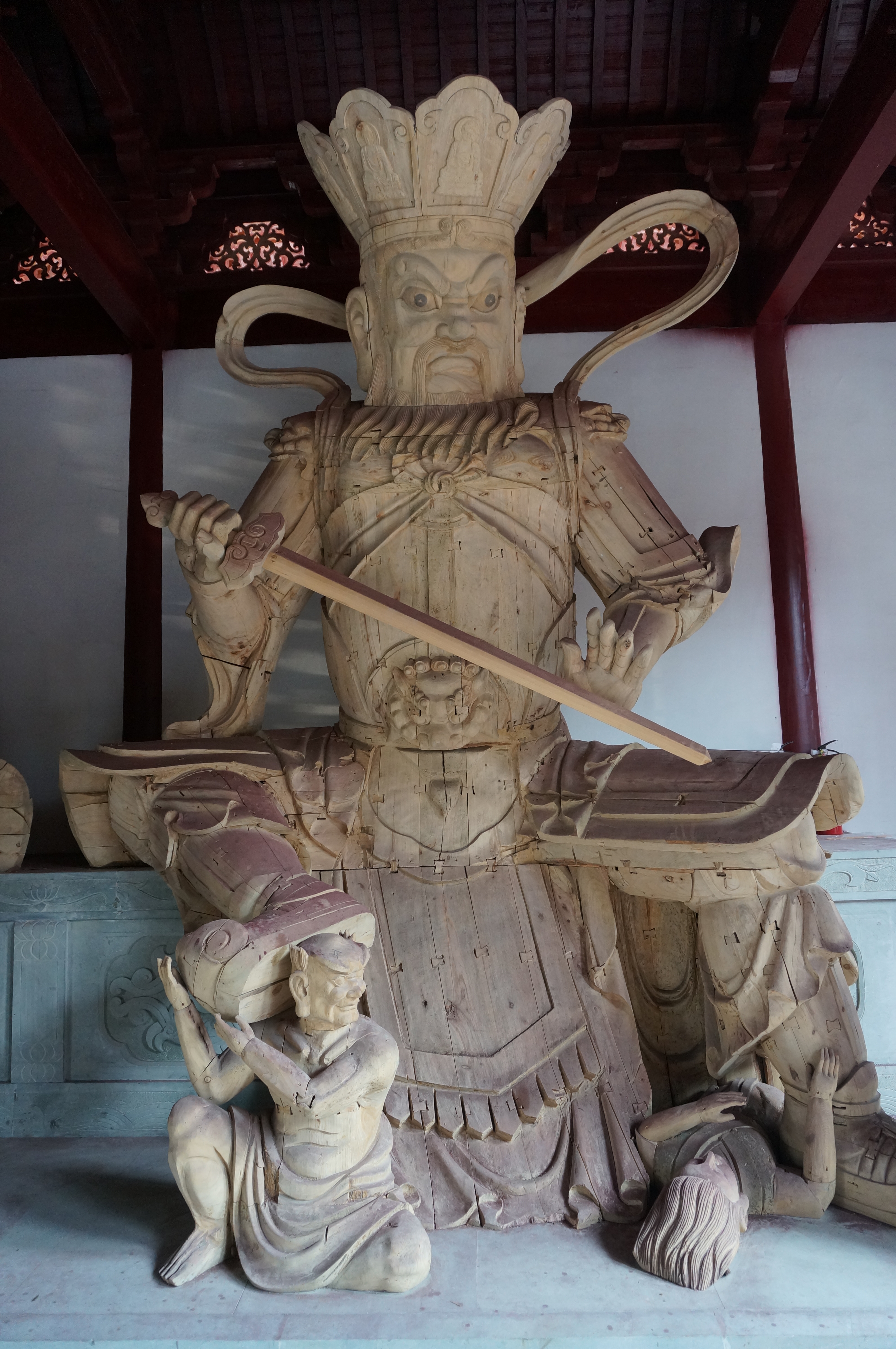Virūḍhaka (Heavenly King) on:
[Wikipedia]
[Google]
[Amazon]
Virūḍhaka is a major deity in Buddhism. He is one of the
 Virūḍhaka is the guardian of the southern direction. He lives on the southern part of Sumeru. He is leader of the
Virūḍhaka is the guardian of the southern direction. He lives on the southern part of Sumeru. He is leader of the

Four Heavenly Kings
The Four Heavenly Kings are four Buddhism, Buddhist gods or Deva (Buddhism), ''devas'', each of whom is believed to watch over one cardinal direction of the world. The Hall of Four Heavenly Kings is a standard component of Chinese Buddhism, Ch ...
and a dharmapala
A ''dharmapāla'' is a type of wrathful god in Buddhism. The name means "''dharma'' protector" in Sanskrit, and the ''dharmapālas'' are also known as the Defenders of the Justice (Dharma), or the Guardians of the Law. There are two kinds of ...
.
Names
The name ''Virūḍhaka'' comes from the identicalSanskrit
Sanskrit (; stem form ; nominal singular , ,) is a classical language belonging to the Indo-Aryan languages, Indo-Aryan branch of the Indo-European languages. It arose in northwest South Asia after its predecessor languages had Trans-cultural ...
term, which refers to sprouting grain. As such, his name means "increase" or "growth.". Other names include:
*Traditional Chinese
A tradition is a system of beliefs or behaviors (folk custom) passed down within a group of people or society with symbolic meaning or special significance with origins in the past. A component of cultural expressions and folklore, common examp ...
: 增長天; simplified Chinese
Simplification, Simplify, or Simplified may refer to:
Mathematics
Simplification is the process of replacing a mathematical expression by an equivalent one that is simpler (usually shorter), according to a well-founded ordering. Examples include: ...
: 増長天; pinyin
Hanyu Pinyin, or simply pinyin, officially the Chinese Phonetic Alphabet, is the most common romanization system for Standard Chinese. ''Hanyu'' () literally means 'Han Chinese, Han language'—that is, the Chinese language—while ''pinyin' ...
: ''Zēngzhǎng Tiānwáng''; Japanese: ''Zōjōten'' or ''Zōchōten''; Korean: 증장천왕 ''Jeungjang Cheonwang''; Tagalog: Birudhaka; Vietnamese: Tăng Trưởng Thiên, a calque
In linguistics, a calque () or loan translation is a word or phrase borrowed from another language by literal word-for-word or root-for-root translation. When used as a verb, "to calque" means to borrow a word or phrase from another language ...
of Sanskrit Virūḍhaka
*Traditional Chinese: 毘楼勒叉; pinyin: ''Bí lóu lè chā''; Japanese: ''Birurokusha''; Korean: 비루늑차''Biluneugcha''; Vietnamese: ''Tì Lâu Lặc Xoa.'' This is a transliteration of the original Sanskrit name.
*Tibetan: འཕགས་སྐྱེས་པོ, Wylie: 'phags skyes po, THL: Pak Kyepo, "Noble Birth"
*Thai: ท้าววิรุฬหก Thao Virunhok is an honorific plus the modern pronunciation of Pali Virūḷhaka.
Characteristics
Kumbhanda
A (Sanskrit) or (Pāli) is one of a group of dwarfish, misshapen spirits among the lesser deities of Buddhist
Buddhism, also known as Buddhadharma and Dharmavinaya, is an Indian religion and List of philosophies, philosophical tra ...
and pretas.
Theravāda
In thePāli Canon
The Pāḷi Canon is the standard collection of scriptures in the Theravada Buddhism, Buddhist tradition, as preserved in the Pāli language. It is the most complete extant Early Buddhist texts, early Buddhist canon. It derives mainly from t ...
of Theravāda Buddhism
''Theravāda'' (; 'School of the Elders'; ) is Buddhism's oldest existing school. The school's adherents, termed ''Theravādins'' (anglicized from Pali ''theravādī''), have preserved their version of the Buddha's teaching or ''Dharma (Buddhi ...
, ''Virūḍhaka'' is called ''Virūlha'' or ''Virūḷhaka''. Virūḷhaka is one of the Cātummahārājāno, or " Four Great Kings," each of whom rules over a specific direction.
China
In China, Virūḍhaka's name Zēngzhǎng Tiānwáng (增長天 lit. Growth King) is a reference to his ability to teach sentient beings to grow in compassion. In Chinese temples, he is often enshrined within the Hall of the Heavenly Kings (天王殿) with the other three Heavenly Kings. In iconographic form, he is clad in armor while brandishing a sword. He is also regarded as one of the '' Twenty Devas'' (二十諸天 Èrshí Zhūtiān) or the '' Twenty-Four Devas'' (二十四諸天 Èrshísì zhūtiān), a group of Buddhist dharmapalas who manifest to protect the Dharma.Japan
In Japan, Zōjōten (増長天) is commonly depicted with a fierce expression. He is clad in armor, often brandishing a sword or spear while trampling a jaki.
References
External links
* Four Heavenly Kings War gods Twenty-Four Protective Deities Japanese Vajrayana Buddhism Buddhism in China Chinese gods {{deity-stub